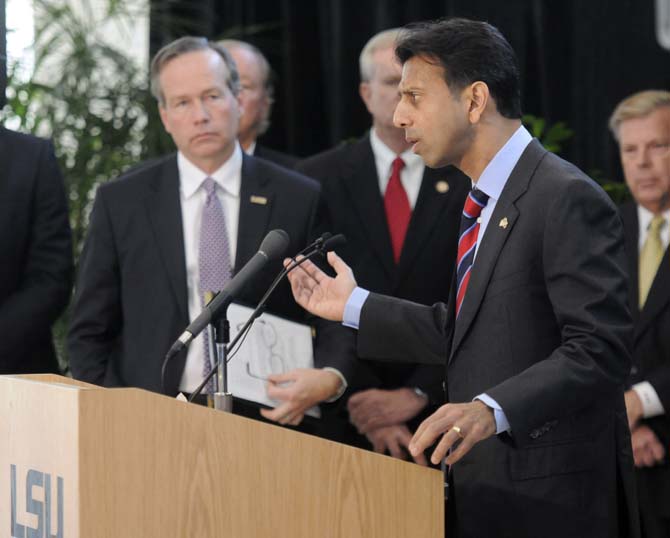Gov. Bobby Jindal introduced his Executive Budget proposal Friday after announcing his administration’s support for higher education at a news conference held at the University last Wednesday.
T Graham S. Howell, legislative liaison for Student Government, said the LSU System will lose $25 million in funding with students paying $87.3 million more in the proposed 2014-15 fiscal year budget.
According to Howell’s analysis of the budget, students will be paying roughly $140 million more for higher education in the state, with state funds decreasing $71 million and federal funds decreasing about $17 million. The Louisiana Office of Student Financial Assistance, which administers TOPS and other financial aid, is budgeted to lose $111 million.
The Board of Regents is set to gain $170 million according to the proposed budget. Jason Droddy, LSU’s director of external affairs, said the Board is constitutionally required to distribute money according to a formula, which changes annually, to meet the needs of the state.
In previous years, the legislature would decide how all of the money would be distributed, Droddy said. He said the exact distribution of the $170 million budgeted for the Board of Regents will be unknown until the formula is finalized for this year.
This analysis clashes with Jindal’s claim at a press conference on campus last Wednesday that higher education as a whole will be seeing a 6.6 percent increase in funding. In the Executive Budget the funding increase is visible after considering non-recurring expenditures.
Droddy said non-recurring expenditures are sources of funding that the state cannot count on every fiscal year. He said last legislative session the state had to rely on money from the Tax Amnesty program, under which the state offered less stringent penalties for those who owed back taxes if the taxes were paid immediately.
Droddy said because the state cannot repeatedly offer that program, the funds are non-recurring and offer a less reliable funding basis than state general funds. He said the proposed budget is a very positive sign for higher education because funding is returning to a recurring basis, rather than from sources like the Tax Amnesty program.
However, Howell said the recurring funds are shifting further toward students paying much more than the state. Howell said the state used to pay about 60 percent of the cost of a University student’s education, with the student paying 40 percent. He said the roles have swapped, with students now paying for the majority of their education.
He said Jindal’s claim that higher education will be receiving $142 million more in the next fiscal year does not line up with the numbers of the budget, with his analysis showing higher education as a whole receiving just a $60 million increase.
The mismatch of information between the budget’s numbers and the state’s statements is evidence of a “recurring theme” that the state does not have the will to support higher education, Howell said.
The University has so much potential to be nationally competitive, Howell said, but only if the state gives the University the funding it needs.
Campus leaders react to Jindal’s budget proposal
January 26, 2014
Gov. Bobby Jindal joins leaders from the state’s higher education systems to make an announcementabout funding for higher education in Baton Rouge Tuesday, January 21, 2014 at The E. J. Ourso College of Business
More to Discover











